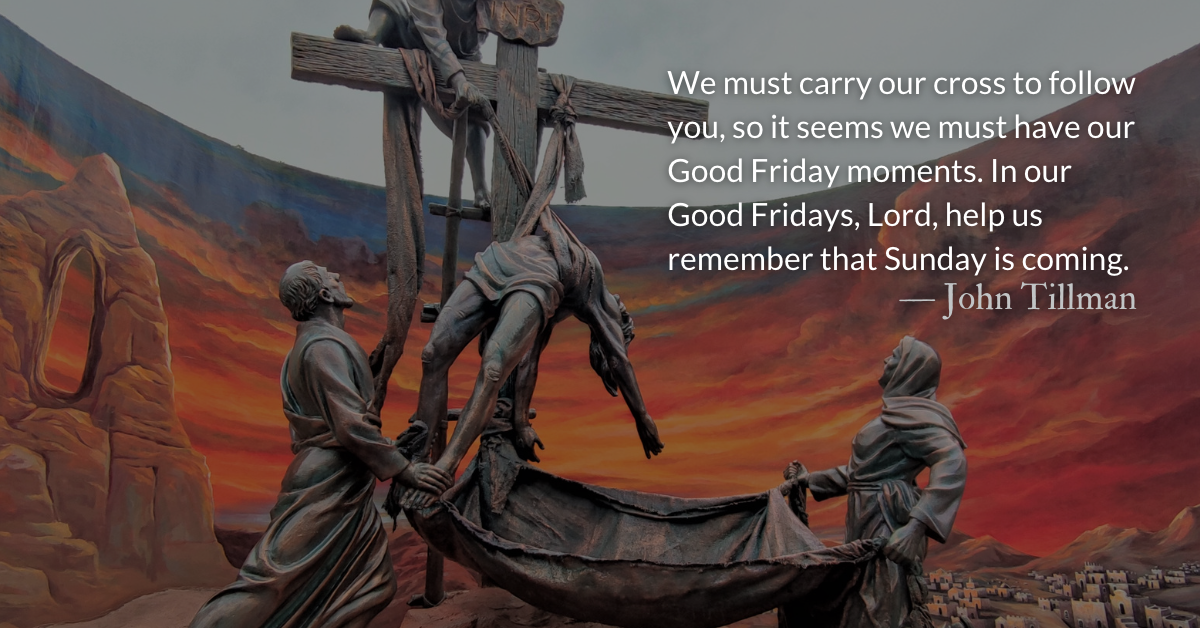Scripture Focus: Acts 7.59
59 While they were stoning him, Stephen prayed, “Lord Jesus, receive my spirit.” 60 Then he fell on his knees and cried out, “Lord, do not hold this sin against them.” When he had said this, he fell asleep.
Reflection: Our Good Friday—Guided Prayer
By John Tillman
Dr. Shadrach Meshach Lockridge’s poetic description of Good Friday has often been quoted but I recently attended a performance in which it was set to gospel music. (There’s no video of it, or I would link it for you.)
Lockridge’s “It’s Friday, but Sunday’s Coming” sits with us in the tension of seeming disaster, the pain of loss, and the feeling that everything has gone wrong.
Each of us may find ourselves in our own “Good Friday” experiences. Like Peter and the other disciples, we may see no hope and want to flee. Like the women and John at the cross, we may be powerless to do anything but weep.
Stephen was the first follower of Christ to face a more literal version of a “Good Friday” when he was put on trial for false accusations and killed for his testimony about Jesus. No matter what kind of despair we find ourselves in, we can know that Sunday is already here in our hearts, even if it hasn’t been fully realized on Earth.
Today, we close with a prayer reflecting on how Stephen faced his accusers by modeling himself after Jesus.
Our Good Friday
Lord Jesus help us to pattern our life after yours.
May we love the unlovable outcasts.
May we love our enemies.
May we speak truth that both challenges and comforts.
May we speak of sins to those who think themselves righteous and of mercy to those who know themselves to be unworthy.
We must carry our cross to follow you, so it seems we must have our Good Friday moments.
When we are insulted and attacked for good works.
When we are unjustly accused and humiliated for the gospel.
In our Good Fridays, Lord, help us remember that Sunday is coming.
That the humble will be lifted
That the meek will inherit
That the weeping will rejoice
That the days of our sojourn, our suffering, and our sanctification will come to an end.
We know that Sunday is coming for us because we are in Friday now and we are following your path.
Sunday is coming for us, because it came for you.
Resurrection is given to us, because we are in you.
Because you got up, we will get up.
Because you rose, we will rise.
We can hold on through the Fridays, Lord, because Sunday is coming.
Divine Hours Prayer: The Refrain for the Morning Lessons
My God, my God, why have you forsaken me? And are so far from my cry and from the words of my distress? — Psalm 22.1
– From The Divine Hours: Prayers for Springtime by Phyllis Tickle.
Today’s Reading
Leviticus 10 (Listen 3:25)
Acts 7 (Listen 8:49)
This Weekend’s Reading
Leviticus 11-12 (Listen 7:20), Acts 8 (Listen 5:10)
Leviticus 13 (Listen 9:34), Acts 9 (Listen 6:05)
Read more about The Wrong People
God doesn’t just use the Stephens. He uses Tamars…Rahabs…Pauls…
If we’ll let him, God will use us, too.
Read more about Much Given, Much Expected
If Abihu and Nadab were given much, how much more have we been given?
We serve a greater High Priest…we bear a greater responsibility.











